Emmys: ‘Rectify’ Stars J. Smith-Cameron, Bruce McKinnon Revisit That Bathtub Reunion
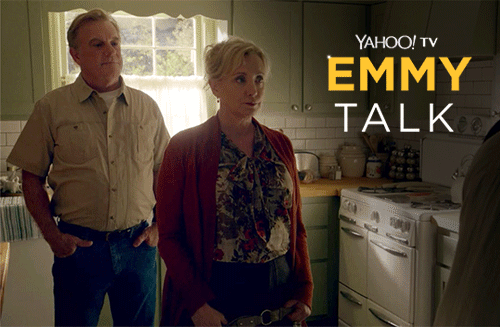
As we enter Emmy season — nomination voting runs June 12 to June 26 — Yahoo TV will be spotlighting performances and other contributions that we feel deserve recognition.
Rectify ended sooner than we’d like, after 30 episodes across four seasons, but if you measure those episodes by the impact they had, and will continue to have, on viewers who appreciated the drama’s incredibly intense slow-build, it’s like it lasted a decade.
One of the most beautiful and satisfying storylines of the series, especially in the final season, was the marriage of Daniel Holden’s mom, Janet, and his solid, supportive stepfather, Ted Sr.
Ted had stepped in to help Janet with her business and family when teenage Daniel was (wrongly, it turned out) convicted for murdering his girlfriend, and once a freed Daniel moved away to try to build a life for himself, Janet and Ted were forced to ask themselves and each other what their marriage was really about. The answers weren’t easy, but the couple came to them honestly, and reunited in a scene so simple, but powerful, that it tied a perfect bow on their whole relationship.
Yahoo TV talked to Janet and Ted portrayers J. Smith-Cameron and Bruce McKinnon about their Emmy-worthy performances, that bathtub scene that sealed Janet and Ted’s future, and their “magical and dangerous” journey on what McKinnon reverently calls “our little Rectify ship.”
What did you think when you found out what Janet and Ted’s storyline would focus on for Season 4?
J. Smith-Cameron: Correct me if I’m wrong, but [series creator Ray McKinnon] let us know that our marriage was really in the balance, and that’s about it. Is that right, Bruce? At the beginning he said, “They’re gonna have some trouble.” He said this before about Teddy and Tawney, and obviously their marriage continued to have trouble, and ours was lucky, you know? I don’t think we knew more than that, and I believe at some point he told us we would be going on a road trip. That’s what I remember.
Bruce McKinnon: Yep. It was pretty vague, you know?
Smith-Cameron: Partly because they were still writing episodes. They’ve written an arc, they thought it through, but they’re really writing and tweaking up to the last moment. Sometimes, in my observation, not just this TV show, but other TV shows, they are hesitant to really tell you until they can release the shooting script, because they might have a 180 that they do and a fit of inspiration, and they don’t want to mislead us into doing a tremendous backstory that then we have to [abandon].
McKinnon: Yeah, it’s like that whole thing where I was trying to push them to let Ted Sr. sing in a karaoke bar…
Smith-Cameron: This deserves its own article. Bruce has a really beautiful singing voice, this really soulful country singing voice, and plays guitar. Only half-jokingly — you may quote me on this — he said he thought there should be an episode where Ted Sr. got trashed and ended up singing in a karaoke bar. Actually, I think it’s kind of a brilliant idea, because Ted Sr.’s so circumspect, and kindly, and you know, he’s not given to extrovert displays, so I thought that would have been funny. Bruce was always pitching things, half serious and half funny.
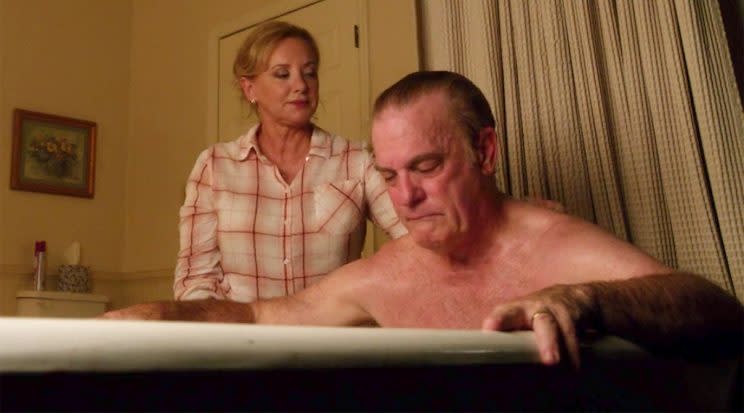
I think one of the best things about the final season is that Janet and Ted’s relationship was addressed in such a real and lovely way. And one of the best examples of that is the bathtub scene in “Happy Unburdening.” It’s so intimate, and yet it feels like such a huge scene, because it’s really them coming back together as a couple, after, as you said, we weren’t sure that was going to happen at the beginning of the season. It seems to set up a new future for them. What was that like to film? Because again, it was a very intimate scene.
Smith-Cameron: Well, it was trickier for Bruce, because he had to be in the altogether in the bathtub. I mean, he wasn’t actually, but it was rigged to look like he was. He was very brave, and very business-like and professional about that part of it, which put everyone on the set at ease. I don’t know what you were feeling inside, Bruce, but you were really good about it. My take on it was, it was such a human scene. Everybody, even people who were not in our storyline, when they got that script, they were like, “Oh, my God.” Did you get this, too, Bruce? People would text me like, “Oh, my God, crying like a baby reading this scene.” There’s that thing about, you can fight over your policy or your position, but when you’re face-to-face in a really human situation, people’s defenses get broken down. I think that scene is a very pithy way of really capturing that. I thought they shot that really beautifully. What did you think, Bruce?
McKinnon: I’ll tell you, when I was in that bathtub totally exposed, not necessarily just as the actor but as the character, that’s literally stripped of any kind of shield or anything — it’s almost like being a baby in the bath, you know? Getting that knock on the door, at that moment… boy, I’m starting to well up just thinking about it. At that moment, it’s like, Ted Sr. has already been through one marriage, and it didn’t work out, and it was really a tough situation. I really tried my best to do unconditional love in this marriage. And I’m a fixer, Ted’s a fixer, and everything’s just broken, and I can’t fix it. I mean, everything. So, as I’m sitting there, just pretty much in the moment, and then I get the knock on the bathroom door… I’m just done. I’m washed up on the bank, you know? Then Janet comes in, and when she scrubs my back, and then she says, “I love you, Ted,” it was totally unexpected.
It was a very raw feeling, and a beautiful thing. We shot it so many different ways, too. I mean, we shot it to where I ended up just crying at different levels, and heaving, and sobbing, and subtle. It was just a very exposed thing, and when you’re doing a scene like that, to have somebody [like J.] — we had such a trust in our give and take as actors, and in our relationship as actors and friends and characters that it helped me to just be open. So it was just a really beautiful, hard thing to do over and over and over again.
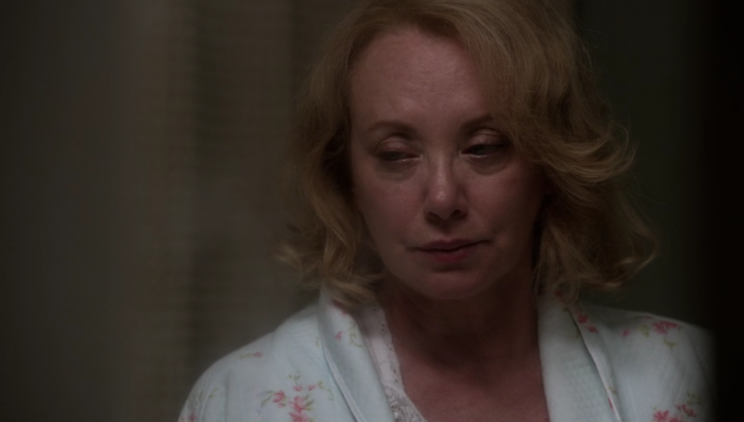
Smith-Cameron: We had a few of those. Remember we had the hotel scene. It was supposed to be in Nashville, but it was on our stages, where I’m crying in the bathroom and [Ted] could sense it, but he’s not in the bathroom with me. Janet is like really emotional, [has] a very deep reserve of feeling, but is so defensive and so wounded about her first-born son that she’s oddly pragmatic. That was the big exception, I thought, was her reconsidering her stance at that point in the marriage. Everything had led up to, “What do we really have in common anymore, now that we don’t have a mutual survival need, [now that] we’re not getting through this ordeal…”
McKinnon: To me, the divide was so wide I thought it was just over.
Smith-Cameron: Yeah! So it was an oddly non-pragmatic step of Janet’s, which I thought was a really cool piece of writing, because that is human nature to do these unexpected kind of things. I think the scene in the garden that preceded [the bathtub scene] — that was a wake-up call for Janet. She takes Teddy back there to tell Ted Sr. this bad news about him and Tawney splitting up, and you can tell he’s very stricken, but he takes it, he’s very stoic, and I think something unexpected happens inside of Janet. She just sees him in a new light, and sees they may not have the same interests, or they may not be the same kind of people, but they have this shared history that’s very deep and very bonding, and how valuable that is.
McKinnon: I’ll have to paraphrase, I don’t remember the exact line, but you know when I was telling Teddy in the garden scene, “When people separate, it’s not too often they get back together” — that’s not just talking about Teddy. Ted was also talking about Janet and him. That’s where he was emotionally as well before that bathtub scene.
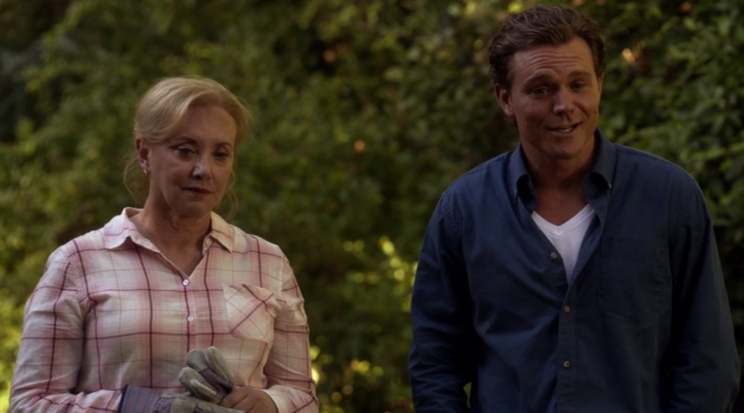
That’s another wonderful thing about the final season for Janet and Ted; we get to see them evolve further as a couple, but also individually, as Daniel resolves to go off and try to forge a life for himself after the trauma this family has lived with for years. What stands out for each of you about how Janet and Ted individually ended up at the end of the series?
McKinnon: J., how much time has passed within the story from beginning to end? Did we ever figure all that out?
Smith-Cameron: Well, Season 1 is a few days. Then beginning with Season 2, a little time has passed. By the time we get to Season 4, there’s an unclear, but significant amount of time that has passed. Like, a few months have passed, the way I understood it. [The show] plays with that idea of time a lot, about time passing slowly, but time passing in a blink, too. That’s a big thing with time. I know for my character, I feel like that was her whole problem. It’s a little bit like in Sleeping Beauty when the whole kingdom falls asleep when Sleeping Beauty pricks her finger. I feel like that’s sort of what happened to the Holden household aside from Amantha, that everyone kind of just ossified. They didn’t know how to feel. They were in limbo. They didn’t know if [Daniel] was going to get executed. And then there was a lovely, kind of slightly dated way the house, the set, looked, I thought. Like it still looked like the family home circa, you know, 1990. I thought emotionally, for my character, Janet was very much behind the shell. A very brittle shell, but very, very, very buttoned up, and very tamped down, and very uncomfortable when it’s spilled out.
Then in Season 4, I came to a boil, and it was a long time coming. It was very satisfying as an actress to play it, because there was always this re-gulping down her feelings, and then around the end of Season 3, actions start making her become less passive and more active. The whole idea of selling the store and her just making the executive decision about that, and her forcing the conversation with Ted about, “What would you want to do if you could do anything?” He has no answer for it immediately. Daniel won’t call me back, so I go see him. He puts me down, and I speak frankly to his new girlfriend. It’s all new behavior from Janet, so for my character, Season 4 was a renaissance, or a sort of un-peeling, and it was incredibly satisfying as an actor to play it, because I had spent, you know, months and years, if you total up all the time of the storyline, playing this very stuck character with a mask kind of firmly in place, and to get to have that unravel and for her to come full circle and recommit to Ted was just an incredible opportunity.
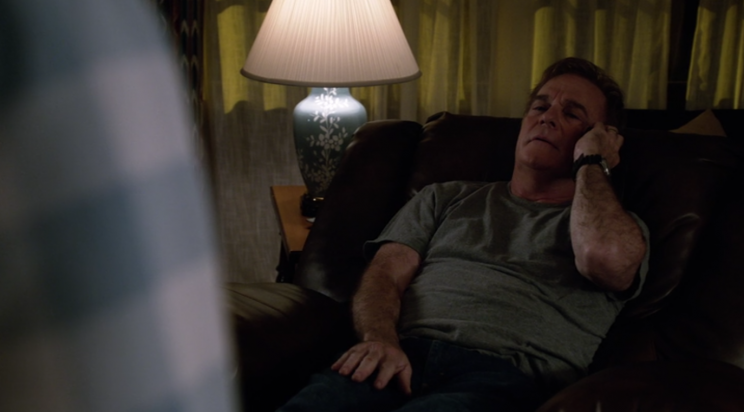
Bruce, what would you say for Ted Sr.? What do you think was the biggest change in him in the last season that led him to that place where he would agree that they should sell the tire store? Was it that he was just happy that their relationship was going to continue and he allowed himself to be excited about what their future might be?
McKinnon: Well, as I’m pondering this, I’m sitting in Ted Sr.’s chair here, which they gave me when we wrapped, that big old brown chair.
Smith-Cameron: Yep. Oh, my God, he loved that chair.
McKinnon: Yeah, we’re talking as I’m sitting in it right now, which is helping me remember. Anyway, I guess two words came to my mind: “letting go.” As I think about it, Ted Sr. likes to have things kind of in order in a way. I wouldn’t call him a controlling person, though some people might, and I know Janet had issues with that, and so did Daniel and other people, Teddy… But I think in the fourth season, he evolved as a human by being forced into letting go, which almost comes back to the bathtub scene again. It was just him totally exposed, and letting go, and not trying to fix as much as he had been trying to, you know? Before we picked up Daniel [from the prison], even though things were an emotional upheaval in a way at times, because of possible execution dates and different things happening with families, it was kind of predictable. You were able to know how the day was going to go to a certain extent and how to handle that. But as Daniel came in and with him being there, I guess, he was a teacher as well for all of us. In the end, what I was taught was how to let go and just try to experience life in a different way. When you let go, it can be really scary, but then having Janet there at the end to kind of catch me, it was almost like the roles reversed in a way, because I saved her and her business, in a way, at the beginning, and she saved me at the end.
It’s part of the job that you bring the characters to life in all the roles you play and then you have to let them go, but was it a little harder with this show, with these two incredible characters and this world that you all built with Rectify?
McKinnon: I haven’t let Ted Sr. go yet.
Smith-Cameron: Well, to let them go from our experience, yes, but I think if I understood Bruce right, done within [the characters] themselves, letting go was joyous, I thought. There was a feeling of healing, you know, that happened with that. It was difficult while it was going on, and then there was healing in its wake. For us to let go of the series, I think it is hard for all of us. I can only speak for myself. I feel like we did it proud. I’m proud of it. We worked very well as an ensemble. Ray was incredibly vigilant, almost just hard-on-himself-vigilant over quality control of it, and it paid off. I wish it had gone on, but I also feel a sense of fullness and completion that he handled ending it beautifully, and I can only be proud of it. Ultimately, that’s the overriding feeling I have, is that I’m very proud of it as a complete piece.
McKinnon: Yeah, I just echo all that. It was a beautiful, artistic experience for an actor, and just for a human being, to be involved in that kind of environment of camaraderie and quest. We sailed out on our little Rectify ship and did our fantastic journey, magical and dangerous, and we sailed back into the little harbor and landed. I’m just grateful for all who were involved — the crew, Sundance, the actors, Ray. God bless Ray and this wild idea he had some long time ago about doing this show, and him being our father figure. He was captain of the ship that we sailed on. It was a beautiful experience and yeah, it’s hard to let go, but it’s just because it was such a wonderful time. But like J. said, mission accomplished. I’m proud. Proud, happy, and very grateful for being on board with this whole event.
Read more from Yahoo TV:
Emmys: ‘This Is Us’ Star Milo Ventimiglia Gets Misty Revisiting ‘The Pool’
Emmys: Brian Tyree Henry on the Link Between ‘Atlanta’ and ‘This Is Us’
Emmys: ‘Master of None’ Co-Star Lena Waithe On Crafting Her Coming Out Episode
Emmys: ‘Better Things’ Creator/Star Pamela Adlon on Being the Boss
Emmys: ‘Bates Motel’ EP Kerry Ehrin, Star Freddie Highmore on their Friendship
Emmys: ‘OITNB’ Star Laverne Cox Revisits Sophia’s Brave Pushback Against Solitary Confinement
Emmys: ‘Westworld’ Star Thandie Newton on Embodying the ‘Daring and Vicious’ Maeve
Emmys: ‘Stranger Things’ Star David Harbour Revisits Sheriff Hopper’s Tough-Guy Moment
Emmys: ‘Feud’ Star Susan Sarandon on ‘The First Time I Really Felt Like Bette’
Emmys: ‘Legion’ Star Aubrey Plaza on ‘Trying to Act Like Beyoncé’ in Dance Scene

